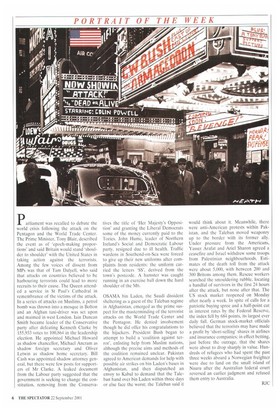PORTRAIT OF THE WEEK
Parliament was recalled to debate the world crisis following the attack on the Pentagon and the World Trade Center. The Prime Minister, Tony Blair, described the event as of `epoch-making proportions' and said Britain would stand `shoulder to shoulder' with the United States in taking action against the terrorists. Among the few voices of dissent from MPs was that of Tam Dalyell, who said that attacks on countries believed to be harbouring terrorists could lead to more recruits to their cause. The Queen attended a service in St Paul's Cathedral in remembrance of the victims of the attack. In a series of attacks on Muslims, a petrol bomb was thrown into a mosque in Bolton and an Afghan taxi-driver was set upon and maimed in west London. lain Duncan Smith became leader of the Conservative party after defeating Kenneth Clarke by 155.933 votes to 100,864 in the leadership election. He appointed Michael Howard as shadow chancellor, Michael Ancram as shadow foreign secretary and Oliver Letwin as shadow home secretary. Bill Cash was appointed shadow attorney general, but there were few posts for supporters of Mr Clarke. A leaked document from the Labour party suggested that the government is seeking to change the constitution, removing from the Conserva
tives the title of 'Her Majesty's Opposition' and granting the Liberal Democrats some of the money currently paid to the Tories. John Hume, leader of Northern Ireland's Social and Democratic Labour party, resigned due to ill health. Traffic wardens in Southend-on-Sea were forced to give up their new uniforms after complaints from residents: the uniform carried the letters 'SS', derived from the town's postcode. A hamster was caught running in an exercise ball down the hard shoulder of the M6.
OSAMA bin Laden, the Saudi dissident sheltering as a guest of the Taleban regime in Afghanistan, emerged as the prime suspect for the masterminding of the terrorist attacks on the World Trade Center and the Pentagon. He denied involvement though he did offer his congratulations to the hijackers. President Bush began to attempt to build a `coalition against terror', enlisting help from Muslim nations, although the precise aims and methods of the coalition remained unclear. Pakistan agreed to American demands for help with possible air strikes on bin Laden's bases in Afghanistan, and then dispatched an envoy to Kabul to demand that the Taleban hand over bin Laden within three days or else face the worst; the Taleban said it
would think about it. Meanwhile, there were anti-American protests within Pakistan, and the Taleban moved weaponry up to the border with its former ally. Under pressure from the Americans, Yasser Arafat and Arid l Sharon agreed a ceasefire and Israel withdrew some troops from Palestinian neighbourhoods. Estimates of the death toll from the attack were about 5,000, with between 200 and 300 Britons among them. Rescue workers searched the smouldering rubble, locating a handful of survivors in the first 24 hours after the attack, but none after that. The US stock market reopened on Monday after nearly a week. In spite of calls for a patriotic buying spree and a half-point cut in interest rates by the Federal Reserve, the index fell by 684 points, its largest ever daily fall. German stock-market officials believed that the terrorists may have made a profit by 'short-selling' shares in airlines and insurance companies; in effect betting, just before the outrage, that the shares were about to drop sharply in value. Hundreds of refugees who had spent the past three weeks aboard a Norwegian freighter were due to land on the small island of Nauru after the Australian federal court reversed an earlier judgment and refused them entry to Australia.
RJC










































































 Previous page
Previous page